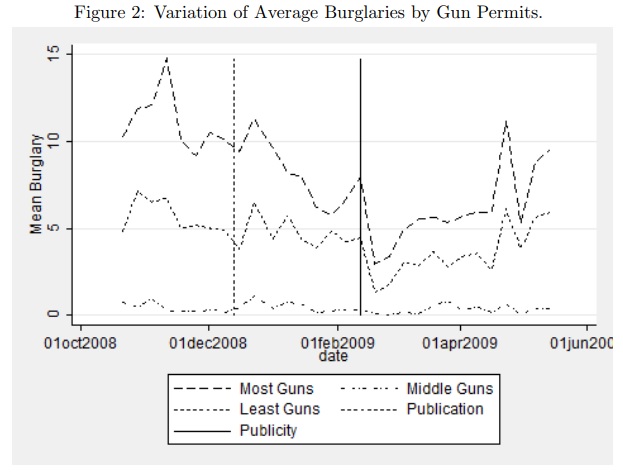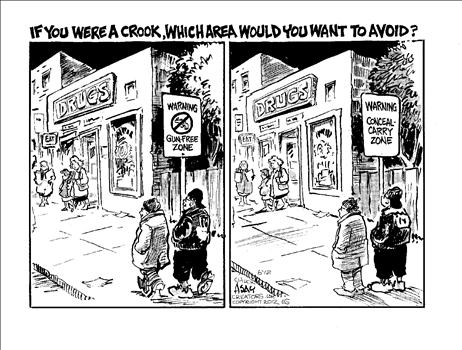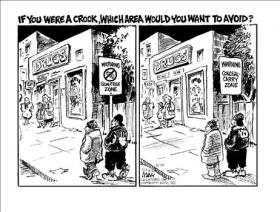Economics in part is the analysis of how people respond to incentives (do high tax rates encourage or discourage work, do trade barriers increase or decrease prosperity, etc).
This type of analysis also applies to the study of crime.
For instance, do guns encourage crime (by giving bad people access to weapons) or discourage crime (by giving potential victims a means of protection)?
My view is that bad people will get guns, even if they are illegal. As such, the only real-world impact of gun control is that law-abiding people are made more vulnerable.
And that means more crime. In other words, crooks respond to incentives.
Let’s look at some new scholarly evidence. Alessandro Acquisti of Carnegie Mellon University and Catherine Tucker of MIT have produced a new study that investigates whether criminals respond to data regarding the likelihood of armed victims.
The main takeaway is that more guns is correlated with less crime.
This paper explores…a case study of the publication of a gun ownership database in Tennessee. This information was made available due to a FOIA request by the local newspaper and made public online. We evaluate how information about the location and numbers of gun permit holders being made publicly available affected crime… Did the online publication of gun permit holders’ information deter, or increase, certain types of crimes? Or did it simply displace crime from one area to another? We investigate this question using detailed crime and handgun carry permit data for Memphis and nearby areas, from before and after the newspaper’s publication of the permits. We evaluate how incidences of burglaries changed before and after the database was published and publicized, as a function of the number of guns in a zip code. Our analysis suggests a post-publicization relative decrease – both in absolute and in percentage terms – in burglaries in zip codes with higher numbers of gun permits, relative to zip codes with median numbers of permits, and a post-publicization relative increase in zip codes with fewer gun permits: our estimates suggest an 18% relative decrease of burglaries in those zip codes with the largest number of gun permits.
Wonkier readers may be interested in this chart, which maps burglary rates over time in neighborhoods with varying rates of gun ownership.

The authors explain what the numbers imply.
Figure 2 shows mean trends, over time, for burglaries in the period from October 2008 to May 2009. …the figure…suggests an upward trend in crimes across all zip codes in December, spiking around Christmas, followed by a downward trend in January. After the publicity around the database started intensifying in early February (solid vertical line), the downward trend seems to intensify. …From the perspective of our analysis, what matters is whether burglary trends in zip codes with more gun permits differ more from the trends in zip codes with lower numbers of gun permits after the publicization of the database, than they differed before. … zip codes with more gun permits experienced a larger decrease in burglaries relative to zip codes with fewer gun permits. …Relative to zip codes with the middle number of permits, zip codes with the highest concentration of permits experienced roughly 1.9 fewer burglaries per week/per zip code in the 15 weeks following the publicization of the database, and those with the lowest concentration experienced on average 1.4 more burglaries. Given that, on average, there were 9.7 burglaries per week in each of the top zip codes, our results imply a 20% relative decrease of burglaries in those zip codes.
For what it is worth, this issue is sort of like an IQ test.
On the margin, bad people are smart enough to target houses (and locations) where they perceive there is less likelihood of armed resistance.
But are our friends on the left smart enough to draw the obvious conclusion about public policy? For some of them, the answer is yes. For most of them, the answer is no.
Daniel J. Mitchell is a public policy economist in Washington. He’s been a Senior Fellow at the Cato Institute, a Senior Fellow at the Heritage Foundation, an economist for Senator Bob Packwood and the Senate Finance Committee, and a Director of Tax and Budget Policy at Citizens for a Sound Economy. His articles can be found in such publications as the Wall Street Journal, New York Times, Investor’s Business Daily, and Washington Times. Mitchell holds bachelor’s and master’s degrees in economics from the University of Georgia and a Ph.D. in economics from George Mason University. Original article can be viewed here.
Self-Reliance Central publishes a variety of perspectives. Nothing written here is to be construed as representing the views of SRC.



